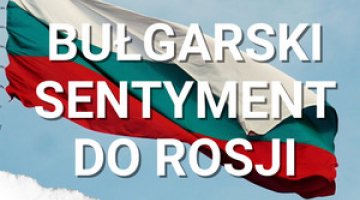Bulgaria: consequences of the murder of journalist Viktoria Marinova
On 6 October Viktoria Marinova, a local journalist, was raped and murdered in the northern Bulgarian city of Ruse. Since the end of September Marinova had been hosting a local television programme dedicated to investigative journalism. Her first guests were members of a group of investigative journalists who, together with their Romanian colleagues, had been examining the embezzlement of EU funds by (among others) the Bulgarian construction company GP Group owned by Georgi Vasilev, an oligarch linked to various politicians. The results of their investigation indicated that the costs of projects carried out by the GP Group on the basis of EU and state budget funds had been inflated by as much as 30-40%. This was allegedly possible thanks to the corruption of officials associated with the ruling centre-right GERB party of Prime Minister Boyko Borisov and the distribution of tenders for the implementation of public procurement. In their investigations the journalists also uncovered links between the GP Group and Russian capital (including Lukoil Bulgaria), as well as its involvement in the laundering of stolen EU money.
Shortly after the murder was reported, the Bulgarian Prime Minister put the onus on law enforcement agencies to investigate and capture the perpetrators. Initially, the Bulgarian prosecutor’s office announced that Marinova’s death was not linked to her professional work, but the investigators later stated that they could not rule out any motive for her murder. Another consequence of the investigation is that €14 million found in the accounts of companies linked to the GP Group has been frozen, pending investigation into suspected corruption on projects financed from EU funds. On 12 October, in turn, the Bulgarian prime minister announced that the GP Group will be barred from tenders for implementing public procurement contracts until the end of the investigation into the abuses. The European Commission has announced that it will ask the EU’s Fraud Office (OLAF) to examine the cases described by the reporters. Marinova’s death was also widely commented upon by global media and European politicians. Indignation at the murder was expressed by representatives of the OSCE, Reporters Without Borders and the European Commission (vice-president Frans Timmermans and the commissioner for justice, consumer affairs and gender equality Věra Jourová). The US also offered to help with the investigation via its embassy in Sofia.
On 10 October German police, in cooperation with Bulgaria, detained a Bulgarian Roma in Germany on suspicion of the murder. The next day, the German court began the procedure for extraditing the detainee to Bulgaria. The capture of a suspect in the murder thanks to the efforts of the Bulgarian police and the prosecutor’s office was welcomed by the Commission’s President Jean-Claude Juncker and the EPP’s candidate for his successor Manfred Weber (Prime Minister Boyko Borisov’s GERB party is part of the EPP). On 10 October Prime Minister Borisov met ambassadors accredited in Sofia at the headquarters of the Bulgarian government and presented the results of the investigation, while at the same time criticising the media and the opposition for what he saw as the overly negative image of the situation in Bulgaria which they had presented in connection with the Marinova case. In response, the journalists investigating GP Group’s abuses issued a statement in which they expressed their lack of trust in the Bulgarian investigative bodies, and criticised the attempts to discredit the idea that the journalist’s murder was connected with her work.
Commentary
- Marinova’s murder was associated in the foreign media with the murders of journalists in Malta and Slovakia earlier this year, suggesting that the crime was related to the victim’s work in the Bulgarian case as well. The government in Sofia could not unequivocally reject this interpretation because it would have exposed them to charges of conducting the investigation in a suspicious manner. However, immediately after the arrest of the murder suspect, Prime Minister Borisov began to emphasise that the motive had nothing to do with Marinova’s work. Despite his efforts, reports on the murder in the foreign media have served to publicise the problem of systemic corruption in Bulgaria, which has negatively affected its attempts to join the Schengen and euro zones, and has postponed its chances of ending the Cooperation and Verification Mechanism regime applied to it by the European Commission.
- On the annual index of perceptions of corruption conducted by Transparency International, Bulgaria has been considered the most corrupt country in the European Union for years. Although Prime Minister Borisov’s GERB party has won successive elections by promising to fight corruption and organised crime, in practice it has been most likely to tolerate corrupt associations between the government and local businesses. This has been revealed by the links disclosed by journalists between the GP Group and people surrounding Prime Minister Borisov and local politicians belonging to GERB. According to information disclosed by the media, it also appears that the current deputy finance minister had set up tenders to ensure that they were won by companies of which he is a co-owner.
- The likely consequence of the suspicions that EU funds were embezzled by the GP Group is an investigation by OLAF into the matter. The initiation of another investigation into fraud connected with the granting of EU funds to countries which are net beneficiaries of the EU budget will likely be used during the negotiations on the EU’s new financial perspective for the period 2021-27. Issues of corruption and problems with the rule of law may be arguments for the net contributors to make cuts in individual countries’ envelopes for the cohesion policy, or to tighten supervision over the spending of EU funds.
- Prime Minister Borisov is trying to reassure both domestic and foreign public opinion, arguing that the murder of Viktoria Marinova had no connection with her work or any political connotations. However, the scandal around the GP Group and the murder of Marinova have drawn public attention to the relationship between GERB politicians and dishonest business, which may contribute to a further decline in support for the party. Recent opinion polls conducted before Marinova’s murder indicate a continuing decline in GERB’s lead over the main opposition force, the Bulgarian Socialist Party.





